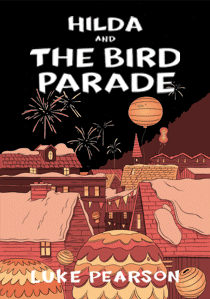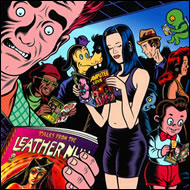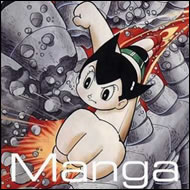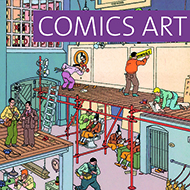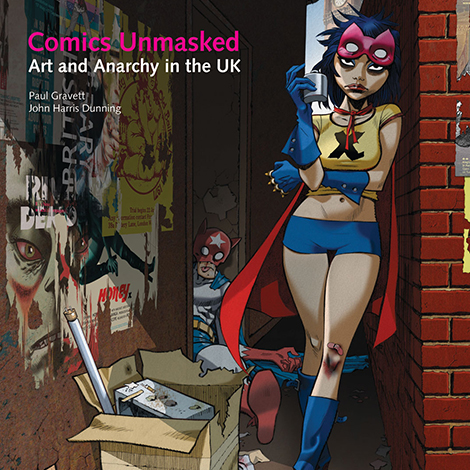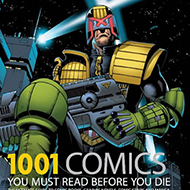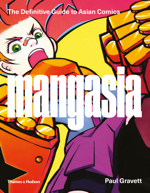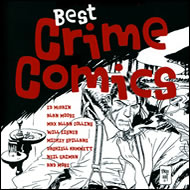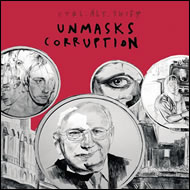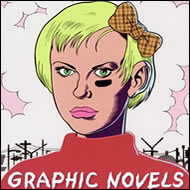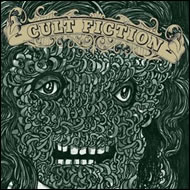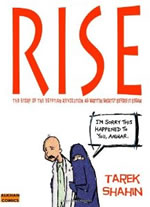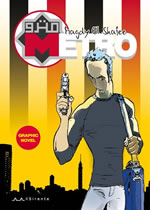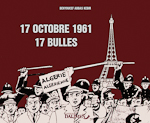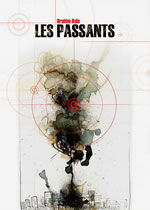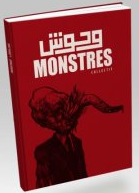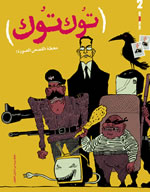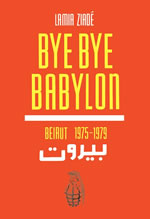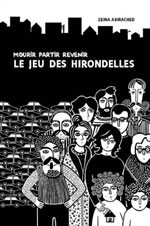Current Comics In The Middle East:
No Laughing Matter
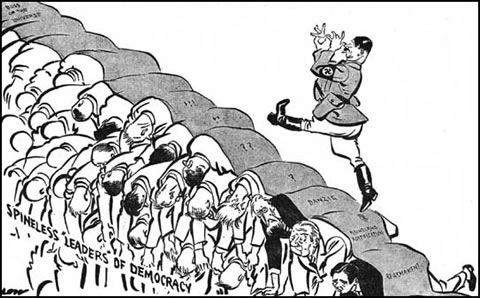
David Low, Evening Standard (8th July, 1936)
The corrupt have good reason to loathe cartoonists. During the Second World War, David Low figured high on Adolf Hitler’s list of targets, because the New Zealand-born cartoonist was among the first and most effective in the British press to mercilessly caricature the Führer.
To this day, one measure of the freedom of expression in any society is how outspoken its cartoonists are allowed to be in newspapers, magazines and increasingly in book-length comics or ‘graphic novels’ aimed at adult readers. Persepolis, Marjane Satrapi‘s memoir of growing up in Tehran and as an exile in Europe, and Palestine, a first-hand account of what trained journalist Joe Sacco witnessed in Gaza, are two best-selling examples published in the West.
The role of socially and politically engaged comics of this kind, through their techniques of reportage, autobiography, satire, and commentary on everyday life, has also become increasingly significant in the Middle East, where the medium has typically been confined to a juvenile audience. Censors may have tried to suppress them, but throughout the ongoing ‘Arab Spring’, new types of comics are also enjoying their own ‘Spring’ as one of the most accessible, low-tech ‘social media’ to spread personal viewpoints and protests.
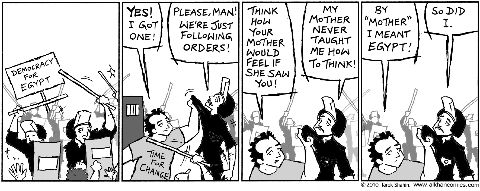
Young Egyptian cartoonist Tarek Shahin sums up how much attitudes have changed. “In just a couple of years we went from people telling me, Why are you writing about politics and social taboos? to asking Why aren’t you writing MORE?” Through his strip Al Khan in The Daily News Egypt, an independent English-language newspaper, Shahin wanted to offer local and global readers “...a different take on Egyptians and Middle Eastern issues than the naive coverage they receive from their respective mainstream media outlets.” In the spirit of Garry Trudeau’s Doonesbury characters, Shahin’s cast covers a spectrum of beliefs from liberal capitalist newspaper publisher Omar to extreme leftist reporter Nada.
After two years of tackling sometimes highly controversial topics such as marriage between cousins and genital mutilation of women, Shahin chose to pause his serial on April 28th 2010: “I felt that many of my lead characters, diverse as they are, had evolved at a faster pace than the wider society. Who knew that less than nine months later I would stand in Tahrir Square and witness not just a revolution against an oppressive regime but an evolution of the people into something different, the opposite of stagnant, a constructive gel of minds and hearts?” Shahin has now compiled his strips into the book Rise as an account of ‘The story of Egyptian Revolution as written shortly before it began’ and dedicates it to the 850 people who died making the Revolution possible.
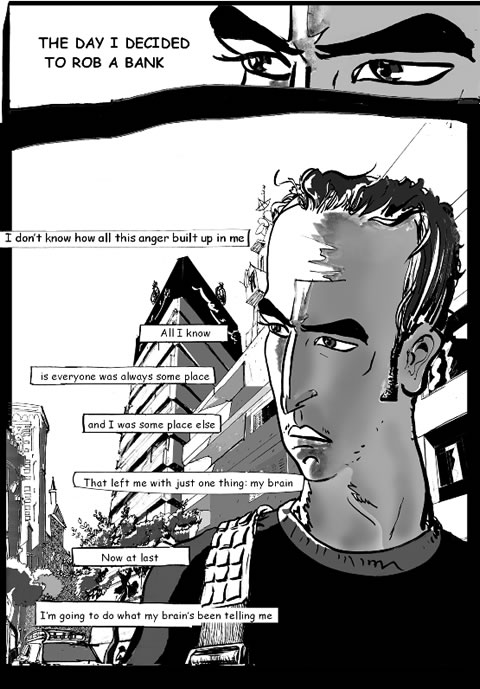
Another Cairene cartoonist, Magdy El Shafee, received a much harsher official response to Metro, his pioneering graphic novel for adults, published in 2008. El Shafee combined a heist thriller based around Cairo’s subway with a portrait of his people, so caught in the ‘trap’ of day-to-day survival that most cannot contemplate challenging state repression. Not long after publication by political activist Mohammed Sharqawy, all copies of Metro were looted in a raid without a warrant on the publisher’s offices and removed from bookstores. In November 2009, a Cairo court fined both its publisher and creator and banned the book for being “offensive to public morals.” While the story contains one mild sex scene and some edgy language in colloquial Egyptian instead of formal Arabic, what probably offended the authorities far more was its critique of the country’s regime and its advocacy of people power.
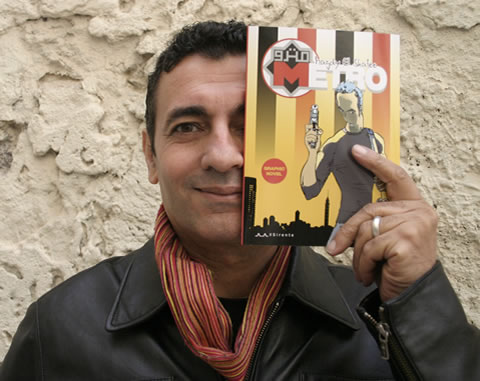
In the character of Shihab, El Shafee creates a provocative anti-hero, whose small software company is about to go under without the right connections to secure a bank loan. Disillusioned with the system, Shihab decides to get the money for himself by staging an armed bank robbery and dismisses his assistant’s anxieties about the police, stating “They’re all busy with the peace and security of one single person”, a reference to the unseen yet ever-present President Mubarak. Several of Mubarak’s cohorts do appear, thinly disguised but instantly recognizable to Egyptian readers; one “piece of garbage” is thrown onto the street and assaulted by a furious public. Part of the call for change which finally ousted Mubarak in 2011, Metro arrives in English in 2012 from Metropolitan Books.
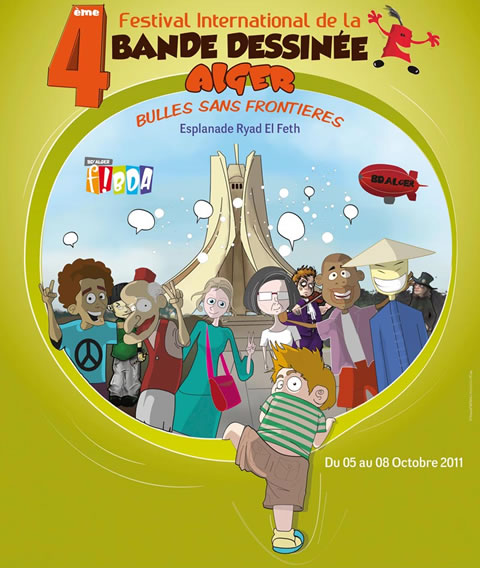
In early October, in the shadow of the Monument of the Martyrs, the bustling tents of 4th International Comics Festival of Algiers or FIBDA symbolised the growing diversity of voices speaking out through comics in the Maghreb and beyond. Under its dynamic director, Dalila Nadjem, FIBDA convenes an international array of guests and an eager public. Nadjem also edits the Algerian comics magazine El Bendir and a list of impressive graphic novels published by Editions Dalimen. Their fresh authors include Abbas Kebir Benyoucef, whose historical documentary comic 17 Octobre 1961 recreates forty years later the massacre of peaceful pro-Algerian demonstrators by the Paris police, and Moroccan artist Brahim Raïs, whose Les Passants unleashes a daring wordless expressionist lament against the evils of war. Looking to the future, Algeria’s youthful population seems wide open to the comics medium, and not only to the tradition of French bandes dessinées, as proved by Dalimen’s new themed short-story compendium Monstres showcasing twenty-three promising local novices.
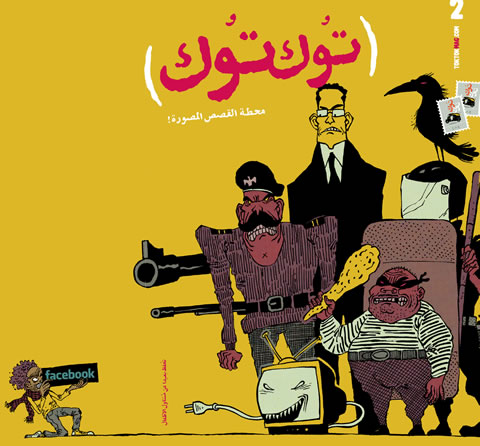
Among FIBDA‘s other first-time guests was Mohammed Shenawy, an Egyptian cartoonist who quit the soul-destroying advertising field to finance his new adult comics monthly, Tok Tok, named after Cairo’s three-wheeled minicars. Ten days before the revolution of January 25th, his launch issue’s 500 copies sold out at a gallery launch in two hours. The cover of Tok Tok‘s second issue (above) shows an army general, riot policeman and other authority figures grimacing at a hidden threat, revealed on the flap overleaf to be Facebook. Tok Tok‘s team feeds an appetite for liberated commentary, especially amid public impatience with the pace of reforms. “Even if every artist has his own point of view and his way of telling a story, we’re all trying to document the current period in drawings, words and comics.” Shenawy welcomes comics “as a medium that was forgotten for years. We have had good feedback, but we still need to distribute on a wider scale, to reach all the cities of Egypt and Arab countries.”
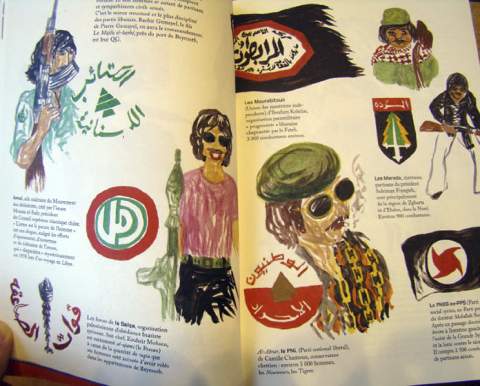
Lebanon is another country where comics are finally awakening, from the exciting, experimental tri-lingual anthology Samandal to Bye Bye Babylon (Jonathan Cape, see spread above), Lamia Ziadé‘s evocation in text and images of her 1970s childhood in the powder-keg paradise of Beirut. Zeina Abirached also grew up there a bit later, never knowing anything else other than the war. “People have not written a lot about the Civil War in Lebanon, perhaps because it is too recent, its protagonists are still here. So there are no official versions of the war until now. One needs a bit of distance to arrive at a version that is not partial or biased.”
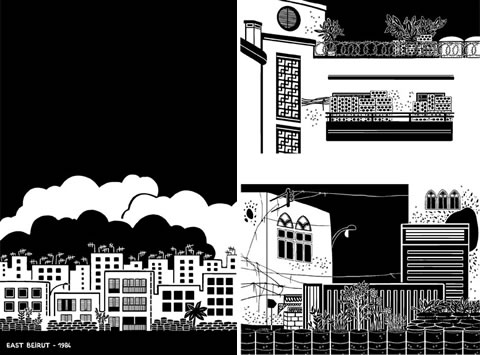
In A Game of Swallows (above), in English from Lerner Books in 2012, she evokes the divided capital and its citizens’ attempts “to preserve some dignity and normailty, a sort of resistance not to cede to the pressures of war.” This is one of four graphic novels she has developed from her family background, published in France though unavailable so far in Arabic.
Back in Cairo, Tarek Shahin is not alone in sensing that change is in the air. “I believe comics have barely begun in the Middle East. Currently few of us write serialised comics or self-contained graphic novels. I doubt that will be the case in five or ten years.”
Posted: January 22, 2012An edited version of this Article was first published in the January 2012 edition of Gulf Life Magazine.

